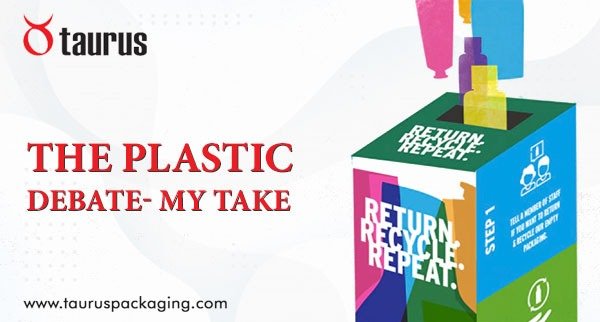The Plastic Debate- My Take

Our rapid industrial revolutions have always been unchecked. Putting pressure on the
world’s resources has always been the side effect of industrialization and consumerism; be it oil, coal, human resource and even plastics.
The unbalanced production and consumption have led to our resources running out or
getting over-used. It is causing a significant impact on the environment especially plastics.
But let me ask a question…
Is the Plastic really the problem?
Plastic has many benefits. It keeps many industries and technologies running. It has made the construction of many consumer durables and cars easier with lightweight plastic materials. Plastic packaging also contributes to minimizing food waste, increases food shelf life when packed and makes its movement cheaper and easier to far fledged regions of the world.
Plastics is a boon, for the food scarcity problem of the world.
What is the problem?
A war on all plastics has been declared by media, environmentalists and Greta Thunberg’s of the world. Why is #SayNoToPlastic trending everywhere? Plastic litter is overflowing our landfills, oceans, reaching food chains of animals, marine life and even us humans as microplastic particles.
Plastic is not getting recycled, use is unchecked, burnt in uncontrolled conditions, drains getting clogged, beaches are littered.
Then what is the Real Problem?
Its not plastics to be blamed. Any material used and littered unchecked will create the same issues. Even you throw the glass on the floor, it is bound to cause harm. All resources must be used and disposed of properly. Why blame Plastics, if we are not handling it properly.
The solution does not lie in banning plastics. Loom around, plastics are everywhere. Food packaging, pharmaceuticals, automobiles, furniture, clothing etc. Imagine life without plastics in all these products. Let’s do the right thing, let’s recycle, reuse and reduce. But banning plastics is not the solution.
At a time when a ‘climate emergency’ has been declared, it is important that people
understand that ‘plastic-free’ does not necessarily mean ‘better for the environment’.
Using any material has environmental costs, but the costs associated with plastic products are often significantly lower than using alternative materials.
Plastics provide many critical benefits across a range of products and it’s important this fact is recognized. Plastics will – and should – continue to play a vital role in all our lives going forward.
